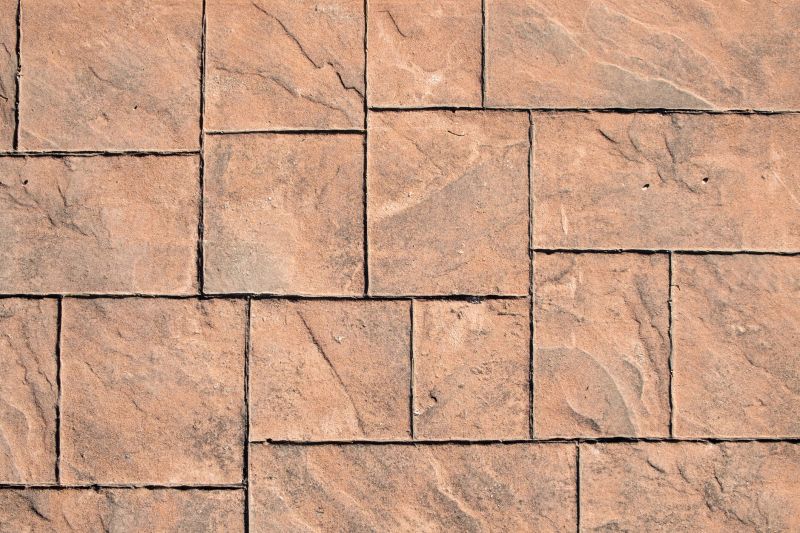Expert Picks For Stamped Concrete Service Equipment and Tools
A curated selection of essential products that ensure professional-grade stamped concrete applications every time.
 In Franklin, Tennessee, stamped concrete services have become increasingly popular for enhancing outdoor spaces, driveways, patios, and walkways. The success of a stamped concrete project heavily relies on the selection of quality products that ensure durability, aesthetic appeal, and ease of application. From surface preparation to finishing touches, a variety of tools and materials are involved in creating a professional-looking stamped concrete surface. These products help achieve textured patterns and decorative finishes that mimic natural stone, brick, or slate, offering a versatile alternative to traditional paving options.
In Franklin, Tennessee, stamped concrete services have become increasingly popular for enhancing outdoor spaces, driveways, patios, and walkways. The success of a stamped concrete project heavily relies on the selection of quality products that ensure durability, aesthetic appeal, and ease of application. From surface preparation to finishing touches, a variety of tools and materials are involved in creating a professional-looking stamped concrete surface. These products help achieve textured patterns and decorative finishes that mimic natural stone, brick, or slate, offering a versatile alternative to traditional paving options.
Top Overall Option
Stamped Concrete Texture Mats
Stamped concrete texture mats are versatile tools that allow users to imprint various patterns onto freshly poured concrete, creating textured surfaces that resemble natural stone, brick, or slate. These mats are made from durable materials designed to withstand repeated use and provide consistent patterning. They are compatible with a range of concrete mixes and can be used in both residential and commercial projects. Proper application of texture mats, along with suitable release agents and finishing techniques, can contribute to achieving a professional appearance that enhances outdoor aesthetics.
Types of Products For Stamped Concrete Service
Stamping Pattern Mats
Flexible mats with various patterns used to imprint textures onto concrete surfaces.
Release Agents
Powders, liquids, or sprays that prevent mats from sticking to concrete and help achieve clean impressions.
Color Hardener
Powdered coloring agents applied to concrete surface to add vibrant color and enhance texture.
Integral Color
Color mixed directly into concrete before pouring for uniform coloration throughout the slab.
Liquid Color Stains
Translucent liquid dyes used to create decorative color effects on stamped concrete surfaces.
Sealers
Protective coatings that enhance appearance and durability of stamped concrete, available in matte or glossy finishes.
Acid Stains
Chemical stains that produce variegated, natural-looking color effects on concrete surfaces.
Concrete Mixes
Specialized mixes formulated for stamping, offering the right consistency and strength for pattern imprinting.
Stamping Tools
Hand tools and rollers that assist in creating consistent textures and patterns during stamping.
Edge Restraints
Materials used to define and contain stamped concrete areas for clean, professional edges.
Texturing Brushes
Tools used to add fine details or distressing effects to stamped concrete surfaces.
Surface Retarders
Chemical agents that delay surface curing, allowing for decorative techniques like antiquing.
Popular Choices
Widely used for imprinting patterns in stamped concrete projects, available in numerous designs.
Popular for their ease of application and effective separation of mats from concrete.
Commonly chosen for adding durable color to stamped concrete surfaces.
Favored for achieving consistent, uniform coloring within concrete slabs.
Preferred for enhancing the appearance and providing long-lasting protection.
Popular for creating unique, variegated color effects that mimic natural stone.
Complete sets that include powders, stains, and sealers for comprehensive decorative work.
Commonly used for creating consistent textures and patterns across large surfaces.
Popular for decorative finishing techniques and antiquing effects.
Used for touch-ups and detailed color accents on stamped surfaces.
Frequently chosen for clean, defined borders in stamped concrete installations.
Selected for safety in outdoor stamped concrete areas exposed to moisture.
Choosing the right products for stamped concrete involves understanding the different stages of the process. Proper concrete mixes, stamping mats, release agents, sealers, and coloring agents are essential components. Each product plays a specific role in ensuring the final outcome meets desired standards of appearance and longevity. For instance, textured stamping mats are available in numerous patterns, allowing for customization to match architectural styles or personal preferences. Sealers and colorants add vibrancy and protection, helping the finished surface withstand foot traffic, weather, and daily wear.
In Franklin, TN, contractors and DIY enthusiasts alike prioritize products that offer ease of use, consistency, and reliable results. High-quality tools and materials can make a significant difference in achieving a seamless, aesthetically pleasing surface that maintains its appeal over time. It is also important to consider compatibility between products to prevent issues such as peeling, cracking, or uneven coloring. Investing in reputable products tailored for stamped concrete ensures a smoother installation process and a more durable, attractive final product.
Whether working on a residential patio or a commercial walkway, selecting appropriate products for stamped concrete service is crucial. Understanding the variety of options available and their specific applications can help users make informed decisions, leading to satisfying results that enhance outdoor spaces in Franklin and beyond.
Key Buying Considerations
- Compatibility of products with concrete mix and project requirements.
- Ease of application and user-friendliness of tools and materials.
- Durability and longevity of sealers and colorants under outdoor conditions.
- Range of patterns and textures available to match design preferences.
- Compatibility between release agents and stamping mats to prevent sticking issues.
- Colorfastness and resistance to fading over time.
- Environmental conditions during application, such as temperature and humidity.
- Ease of cleaning and maintenance of tools and finished surfaces.
- Availability of comprehensive kits versus individual products.
- Cost-effectiveness and value for the scope of the project.
- Brand reputation and user reviews for reliability and performance.
- Safety considerations, including non-toxicity and proper handling of chemicals.
- Time required for application and curing processes.
- Finish options such as matte or glossy sealers to match aesthetic goals.
- Surface preparation requirements to ensure optimal results.
